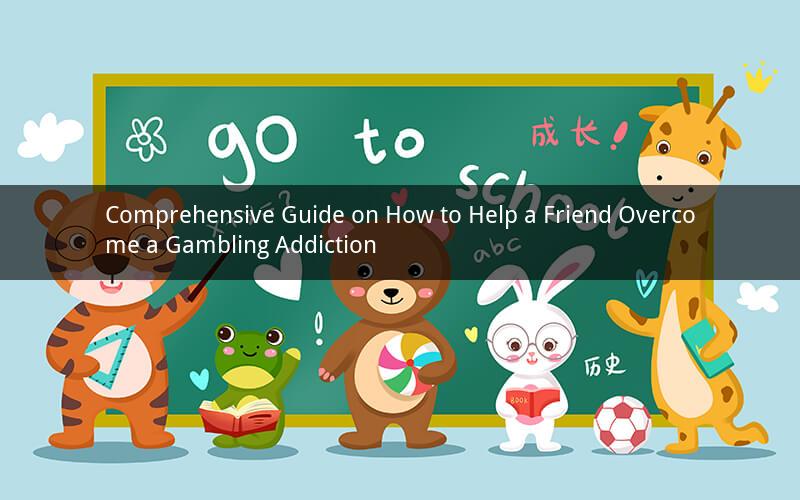
Introduction:
Gambling addiction is a serious issue that affects millions of people worldwide. It can lead to significant personal, financial, and social consequences. When someone you care about is struggling with a gambling addiction, it's crucial to know how to help them. This guide provides a comprehensive overview of the steps you can take to support your friend in overcoming their gambling addiction.
1. Understand the Addiction
To help your friend, it's essential to understand the nature of their addiction. Gambling addiction is characterized by an inability to control gambling behavior, even when it causes harm. It's a psychological disorder that can lead to severe consequences if left untreated.
1.1 Recognize the Signs
Identifying the signs of a gambling addiction is the first step in helping your friend. These signs include:
- Secretive behavior, such as hiding gambling activities or lying about spending habits.
- Increasing debts, both personal and financial.
- Loss of interest in hobbies or activities that were once enjoyable.
- Neglecting personal responsibilities, such as work, school, or family obligations.
- Feeling restless or irritable when not gambling.
1.2 Understand the Psychological Impact
Gambling addiction is often accompanied by psychological issues, such as depression, anxiety, and substance abuse. It's essential to recognize these co-occurring disorders to provide appropriate support.
2. Encourage Professional Help
Seeking professional help is crucial for your friend's recovery. Encourage them to consult a therapist or counselor specializing in gambling addiction. Here's how you can help:
2.1 Research Treatment Options
Research various treatment programs, including inpatient, outpatient, and online therapy options. Provide your friend with information on reputable treatment centers and support groups.
2.2 Accompany Them to Appointments
Offer to accompany your friend to therapy sessions or support group meetings. This shows your support and can help them feel more comfortable opening up about their addiction.
2.3 Learn About Treatment Techniques
Familiarize yourself with common treatment techniques, such as cognitive-behavioral therapy (CBT), motivational interviewing, and contingency management. This knowledge can help you better support your friend during their recovery journey.
3. Provide Emotional Support
Emotional support is crucial for your friend's recovery. Here are some ways to offer support:
3.1 Be Understanding and Non-Judgmental
Acknowledge that your friend's addiction is a difficult struggle and show empathy. Avoid blaming or shaming them for their behavior, as this can worsen their feelings of guilt and shame.
3.2 Offer a Listening Ear
Be available to listen to your friend's concerns and struggles. Encourage them to express their feelings without fear of judgment or criticism.
3.3 Celebrate Small Milestones
Celebrate your friend's progress, no matter how small. Recognizing their efforts can boost their confidence and motivation.
4. Encourage Financial Literacy
Gambling addiction often leads to financial difficulties. Help your friend regain control of their finances by:
4.1 Budgeting and Financial Planning
Assist your friend in creating a budget to manage their income and expenses. Encourage them to prioritize essential bills and savings over gambling.
4.2 Seek Financial Counseling
Recommend a financial counselor or credit counselor who can help your friend manage their debts and improve their financial situation.
5. Create a Supportive Environment
A supportive environment is essential for your friend's recovery. Here's how you can contribute:
5.1 Encourage Positive Activities
Encourage your friend to engage in activities that promote healthy coping mechanisms, such as exercise, hobbies, or socializing with non-gambling friends.
5.2 Limit Exposure to Gambling
Help your friend minimize exposure to gambling by avoiding casinos, online gambling sites, and other tempting environments.
5.3 Support Family and Friends
Encourage your friend to seek support from family and friends, as a strong support network can significantly improve their recovery journey.
5.4 Attend Support Groups
Encourage your friend to attend support groups, such as Gamblers Anonymous, where they can connect with others who understand their struggles.
Frequently Asked Questions:
1. What should I do if my friend refuses to seek help for their gambling addiction?
- Offer your support and continue to show empathy. Encourage them to consider the negative consequences of their addiction and the benefits of seeking help.
2. How can I help my friend overcome financial difficulties caused by their gambling addiction?
- Assist them in creating a budget, seeking financial counseling, and developing healthy financial habits. Encourage them to prioritize essential expenses over gambling.
3. What if my friend's gambling addiction causes strain in our relationship?
- Communicate openly with your friend about your concerns and feelings. Establish boundaries to protect yourself and seek support from others if needed.
4. Can my friend recover from a gambling addiction?
- Yes, with proper treatment, support, and dedication, recovery from a gambling addiction is possible. Encourage your friend to remain hopeful and focused on their recovery journey.
5. How can I support my friend during their recovery?
- Provide emotional support, encourage professional help, and create a supportive environment. Celebrate their progress and remind them of your unwavering support.